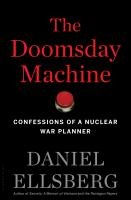Thom reviewed The Doomsday Machine by Daniel Ellsberg
Review of 'The Doomsday Machine' on 'Goodreads'
3 stars
Frightening revelations and some repetition, this book tries to accomplish a few different things. It achieves one well, and is somewhat convincing that we the people aren't powerless.
Economist Daniel Ellsberg, famous for the Pentagon papers, has collected a lifetimes worth of research and thoughts into the risks of Nuclear War, both strategic and tactical. This is the best part of the volume, and it reveals a lot, including just how many people could actually launch nuclear weapons (hint - it's a LOT more than just the president). Because of the doomsday systems in place, most of these launches would trigger automatic responses, ending in nuclear winter or omnicide (great, if depressing, term).
Per the many-worlds hypothesis, are we just the lucky ones who have survived thus far?
Other portions of the book include the transition from attacking military targets to bombing civilian centers, the de-facto target of nuclear weapons. …
Frightening revelations and some repetition, this book tries to accomplish a few different things. It achieves one well, and is somewhat convincing that we the people aren't powerless.
Economist Daniel Ellsberg, famous for the Pentagon papers, has collected a lifetimes worth of research and thoughts into the risks of Nuclear War, both strategic and tactical. This is the best part of the volume, and it reveals a lot, including just how many people could actually launch nuclear weapons (hint - it's a LOT more than just the president). Because of the doomsday systems in place, most of these launches would trigger automatic responses, ending in nuclear winter or omnicide (great, if depressing, term).
Per the many-worlds hypothesis, are we just the lucky ones who have survived thus far?
Other portions of the book include the transition from attacking military targets to bombing civilian centers, the de-facto target of nuclear weapons. The history here is muddled, and has been presented better in other books. I think a more concise one-chapter summary would have been better. The best part of this section is where Ellsberg points out that the atom bomb actually did less damage than the campaign of firebombing in place up to that point - but using less planes.
He concludes the book calling for disarmament, calling for commitments to no first strike, and others. What would have been more impactful (and may in actuality be the case, though still classified) is that we could easily replace the nuclear weapons with missiles that could destroy the weapons and weapon systems - reverting to the original goal, and leaving cities and innocent populations out of jeopardy. He does point out how difficult it would be to change the direction of our current military-industrial complex, and that probably applies equally well to other countries - especially those that lack the newest technology. He also shows where people have effected change related to nuclear topics - all hope is not lost.
Aside from the muddled history, there were sentences and small paragraphs that were duplicates. It almost feels like this was a series of articles collected into a book, and if so, it needed a lot more editing. The best result would have focused on what the author knows best, including details on the Cuban Missile Crisis and the risks and flaws in the system used in the 60s and 70s. In the end, this was a book that was equal parts enlightening, depressing, and frustrating. 3 stars (out of 5).

